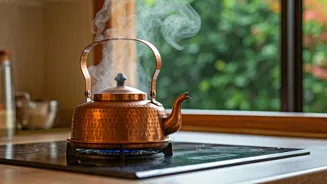The Basics of Boiling
Boiling water is a well-known method for killing bacteria and viruses. In India, it’s a standard practice for ensuring safe drinking water, especially
in areas where water quality may be a concern. The simple act of boiling helps purify the water by killing off any harmful microorganisms that might be present.
Risks of Reboiling
While boiling water is safe, reboiling can pose certain risks. As water boils, it evaporates, concentrating any dissolved impurities like nitrates, fluoride, and other chemicals. These can potentially become more harmful if the water is reboiled multiple times. Think of it like making strong tea – more boiling means a more concentrated brew!
Mineral Concentration Concerns
Reboiling also concentrates minerals in the water. While some minerals are beneficial, excessive concentrations of certain ones can cause health problems. Over time, repeated boiling might lead to higher levels of these minerals, impacting your body. It's crucial to be aware of the potential for mineral concentration.
Safe Boiling Practices
To ensure safety, it's best to boil only the amount of water you need. Always use fresh, filtered water if possible. Avoid reboiling water repeatedly. If you need hot water, boil a fresh batch each time. This helps minimize any potential risks. Think of it as a fresh start for your water!
Staying Hydrated Safely
In India, where water is crucial, be mindful of your water habits. Prioritize safe practices and stay informed. Remember to drink responsibly and ensure that you are consuming the safest possible drinking water. Now, you can enjoy your favorite drinks, like chai, without any worry!


















